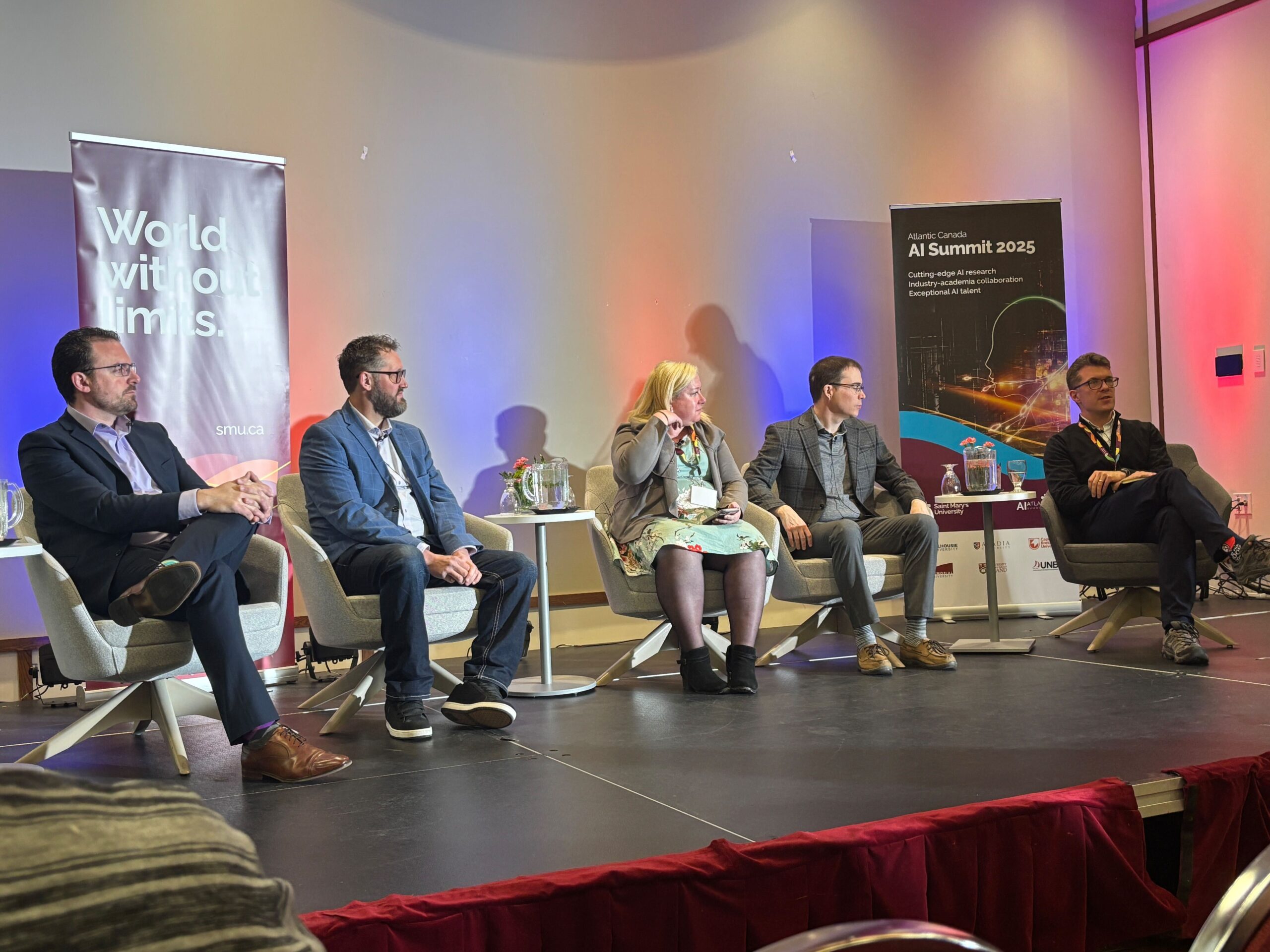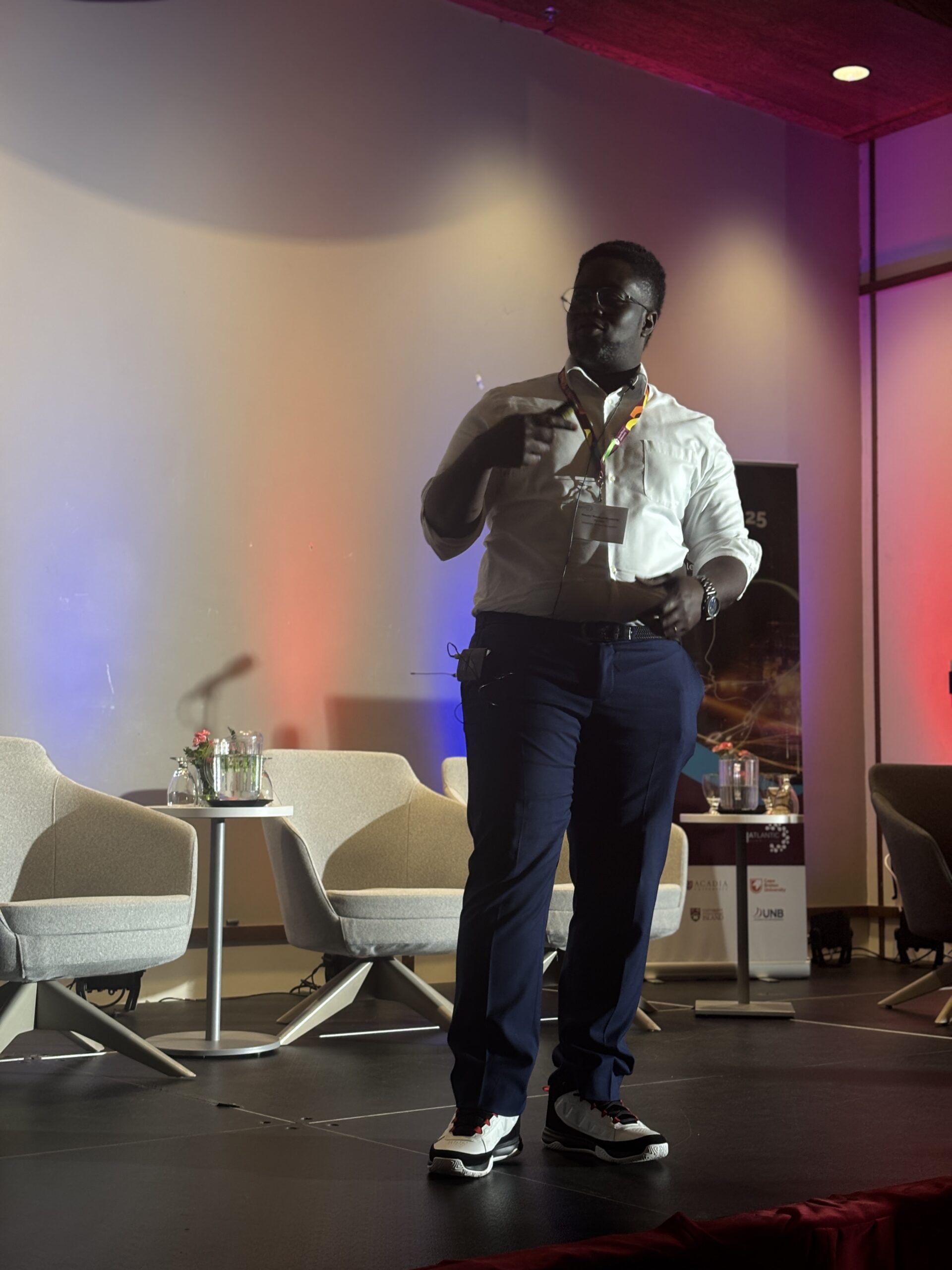May 7, 2025
 Attending the 2025 Atlantic Canada AI Summit at Saint Mary’s University was an energizing experience. The event brought together academics, researchers, industry leaders, and students from across Atlantic Canada to explore the rapidly evolving landscape of artificial intelligence and its implications for our region. The event was packed with compelling discussions and thought-provoking presentations that made a lasting impression, and it was GREAT to see so many Digital Nova Scotia members, including RBC, DeepSense, Mariner Innovations, ACENET, Invest Nova Scotia, Springboard Atlantic, CGI, Dalhousie, SMU, CBU, Acadia University, AI-First Consulting, Barrington Consulting, Cognizant, Virtual Hallway, Myra Media, Avanade, and NS Health.
Attending the 2025 Atlantic Canada AI Summit at Saint Mary’s University was an energizing experience. The event brought together academics, researchers, industry leaders, and students from across Atlantic Canada to explore the rapidly evolving landscape of artificial intelligence and its implications for our region. The event was packed with compelling discussions and thought-provoking presentations that made a lasting impression, and it was GREAT to see so many Digital Nova Scotia members, including RBC, DeepSense, Mariner Innovations, ACENET, Invest Nova Scotia, Springboard Atlantic, CGI, Dalhousie, SMU, CBU, Acadia University, AI-First Consulting, Barrington Consulting, Cognizant, Virtual Hallway, Myra Media, Avanade, and NS Health.
Day 1 focused heavily on showcasing research and academic expertise from across Atlantic Canada’s universities. The opening panel discussion, “Reimagining Atlantic Canada through the Lens of AI,” was a standout moment. One point that particularly stuck was shared by a representative from Google’s Office of the CISO: around 70% of Google search queries are related to health. This statistic highlights an incredible opportunity for AI to improve access to reliable health information and empower individuals with better data for informed decision-making.
During the “AI and Ethics, Policy, and Human Behavior” track, I attended presentations from leading researchers who shared a diverse range of insights. What resonated the most was the dual narrative running through the sessions: while researchers like Kelly, Zhang, and Rajabi emphasized the growing capability of AI in solving practical business challenges, others like Thacker and Sajjad underscored the need for deeper reflection and public understanding of how these technologies function and the ethical complexities they raise. Another important discussion point was around artificial general intelligence (AGI). With how quickly AI capabilities are developing, Kelly made a striking observation that developments in AI suggest AGI could be within reach not in decades, but potentially in just a few years.

Kwasi Boakye-Boateng | Research Associate @ Canadian Institute for Cybersecurity at University of New Brunswick
I also had the chance to attend the “AI in Security, Systems, and Science” track. From physics to autonomous vehicles to cybersecurity, the breadth of AI’s potential applications was nothing short of inspiring. Presentations from Thumeera Wassinghe (MUN) on autonomous navigation and Terrence Tricco (MUN) on AI in physics highlighted how AI is shaping even the most complex scientific fields. Kwasi Boakye-Boateng (UNB) explored how AI is transforming cybersecurity and his presentation stood out in particular—he shared how malicious actors are increasingly using AI in cyberattacks, emphasizing the urgent need for defenders to harness AI as a first line of defence.
Day 2 shifted gears toward industry applications of AI, giving organizations the opportunity to demonstrate how they’re using AI to drive impact. It was exciting to see presentations from Digital Nova Scotia members like RBC, DeepSense, Mariner Innovations, and ACENET. Greg Lukeman, CEO of ACENET, gave a standout talk about the critical importance of AI infrastructure in Canada. He noted that our country currently only has the infrastructure capacity to support 30% of the research that needs to be done. This staggering figure underscored the need for bold investments in computing power and infrastructure if we want to compete globally in AI.
I closed the afternoon with a workshop on AI in healthcare, led by Frank Rudzicz—a Canada CIFAR AI Chair, faculty member at the Vector Institute, and professor at Dalhousie. The session featured insights from multiple health experts using AI to tackle both simple and complex problems, all with the goal of improving patient care and outcomes. It was a powerful reminder that AI isn’t just about efficiency or automation—it can be a tool for compassion, access, and equity within our health systems. Frank also announced that Dalhousie will be launching an AI Institute soon and we’re very excited to see that happen!
The summit left many with a sense of urgency, curiosity, and hope. Urgency to address our AI infrastructure gaps, curiosity to dive deeper into ethical questions raised by these technologies, and hope that with the right leadership and collaboration, Atlantic Canada can position itself at the forefront of responsible AI development.
Written by Derek Leung, Development Lead with Digital Nova Scotia
